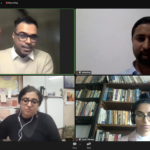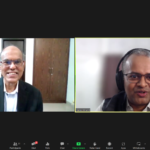Are our children ready for the future? South Asian Panel deliberates on lack of practicality in the Education system
A discussion panel on the topic ‘Gap Between Schools & Practical Education’ was organized by the Centre for Civil Society and the Friedrich Naumann Foundation for Freedom, South Asia on Wednesday, 7th December 2022.
The webinar began with a welcome note for the event, along with a brief introduction of the agenda, delivered by Ms Lakshmi Goyal, CEO, of the Centre for Civil Society. The Keynote Speaker, Ms Kathrin Junkin, spoke about the work done by NSST, a Nepalese-German skills training initiative, based on the German Apprenticeship Programme model. She elaborated on how they teach soft skills, create career opportunities, and provide skilled labour for German and Nepalese companies with the goal to create change agents by generating skills, networks, and economic growth.
The Moderator, Mr Roshan Gandhi, former CEO of City Montessori School, India, proceeded to introduce the panellists and asked them relevant questions on the gap between the education provided by schools and the practical education needed by the job market, pertinent to South Asia.
One of the panellists, Ms Aakriti Parashar, highlighted how the education system in South Asia, particularly in India, is highly textbook-centric, where obtaining marks is the sole focus of education, over the practical application of knowledge. She noted that students often need to “go the extra mile” to learn crucial life skills, which should rather be a part of their curriculum in schools and universities.
Mr Heminda Jayaweera, entrepreneur and innovator, compared the education system in South Asia to a factory system, with the teacher being the sole source of knowledge. He outlined how this is undesirable because the world is changing at a rapid pace, as often-dated education shared by teachers grows less relevant. To keep up with the demands of the job market, one must learn from multiple sources in order to develop soft skills such as analytical, critical, complex problem-solving abilities, teamwork and leadership, for future growth will require a culmination of these abilities.
Mr Suresh Gautam, Head of the Department of Development Education at Kathmandu University, asked whether the education system is ‘producing humans or puppets’. He voiced support for the Apprenticeship Programme and stressed that education providers must identify student and market needs before creating support programs. Giving people what they want prevents migration issues like Nepal’s. Change people’s mindsets, then plan and implement resource training. Taking learning outside the classroom to match industry needs is the key to change, he said.
Honourable Minister of Education, Sri Lanka, Dr Susil Premajayantha spoke about his administration’s plans and efforts to transform the education sector and what it provides the new generation of learners. He outlined the factors that contributed to the gap in education while pointing out specific issues in the Sri Lankan education system. He appreciated the German/Nepali model of apprenticeship and very strongly spoke about Sri Lanka’s aim for 2030 in accordance with the United Nations Sustainable Development Goals, particularly SDG 4: Quality Education.
There was consensus on the importance of changing the mindset of all stakeholders in the education system, with an emphasis on providing students with ‘future-ready’ skills.
Dr Carsten Klein, Head of FNF regional office in South Asia, brought the session to a close by speculating on the need of coming together to overcome the gap between school and ‘real world’ education. He noted that the transition from a learning habitat to a working space is vital for every individual and that adequate guidance to identify abilities and enhance skills is crucial for holistic personal development.
The webinar provided a platform where individuals from different backgrounds and experiences to share their personal journeys and takeaways on the topic. The solutions discussed signalled the transformation, over reform, of the education sector, and the discussion proved to be a great success.




Leave a Reply